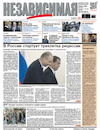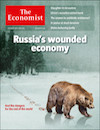“A three-year recession starts in Russia” headlines Nezavissimaya Gazeta, adding that the country faces “tougher times than the government thinks”. According to the Moscow daily, analysts from one of Russia’s largest state banks —

believe the official forecasts for the next three years are way far from reality […]: the country is sinking into a deep recession that could last at least three years. No economic recovery is going to happen between 2015 and 2017. […] Russia’s GDP will fall by 1.3 per cent in 2015, by 1 per cent in 2016 and by 0,5 per cent in 2017. Recovery will not come until at least 2018, with 0.3 per cent growth. […] We will have to forget about investment growth in the next three years: industrial production will fall by 1.8 per cent in 2015 and by 1 per cent in 2016. It will show zero growth in 2017.
Russia’s own growth forecast for its largely “oil-fired economy” – an average 2.1 per cent yearly growth over the next three years – was based on an average price of $110 (€88) a barrel at the beginning of this year, writes The Economist. Now that the price per barrel has tumbled below $80 (€64), the British weekly says “Russia is hurting” —

When economies are on an unsustainable course, international finance often acts as a fast-forward button, pushing countries over the edge more quickly than politicians or investors expect.[… ] More than two-thirds of exports come from energy. The rouble has fallen by 23 per cent in three months. Western sanctions have also caused pain, as bankers have applied the restrictions not just to Mr Putin’s cronies, but to a much longer tally of Russian businesses. More generally, years of kleptocracy have had a corrosive effect on the place. Much of the country’s wealth has been divided among Mr Putin’s friends. […] If Russia’s economy looks likely to collapse, there will be inevitable calls in the West for sanctions to be cut back. This week Mr Putin pointed out that 300,000 German jobs depend on trade with his country. But Angela Merkel rightly stood firm. Actions, Mr Putin must finally learn, have consequences. Invade another country, and the world will act against you. And the same goes for the economy, too. Had Mr Putin spent more of his time strengthening Russia’s economy than enriching his friends, he would not find himself so vulnerable now.
Was this article useful? If so we are delighted!
It is freely available because we believe that the right to free and independent information is essential for democracy. But this right is not guaranteed forever, and independence comes at a cost. We need your support in order to continue publishing independent, multilingual news for all Europeans.
Discover our subscription offers and their exclusive benefits and become a member of our community now!












